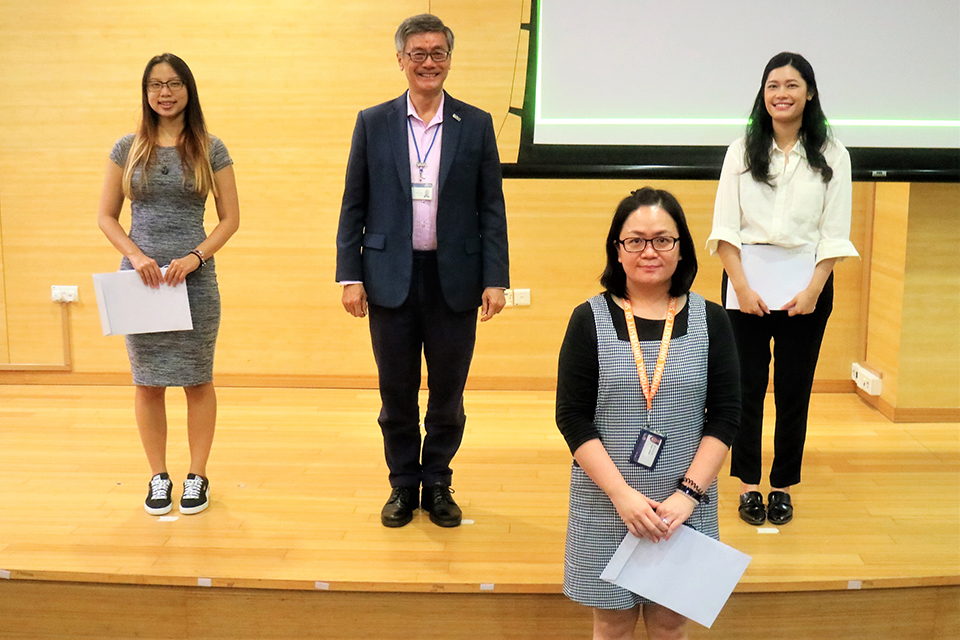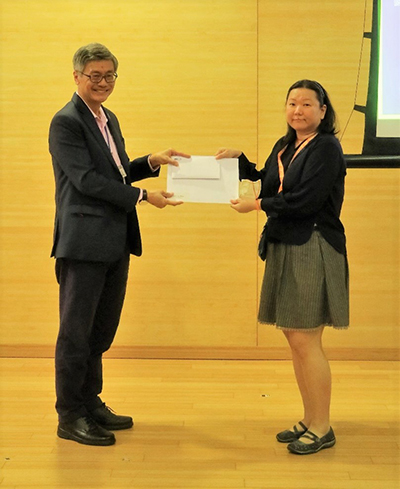In April 2020, NUS launched the Data Literacy Programme (DLP) to empower staff with basic data analytics skills, as part of a University-wide initiative to enhance staff capabilities.
To date, about 600 Executive and Administrative (E&A) staff have completed DLP and a group project as part of the course. Each group project team typically comprised six staff from the same department, who worked on a research question with variables within a data set. Leveraging data concepts and visualisation skills acquired from the course, team members collaborated to analyse data and identify patterns, trends and relationships, and presented the findings to their course instructors.
DLP instructors were subsequently invited to nominate the best projects in their classes, and these shortlisted projects were reviewed and ranked by Professor Carol Hargreaves, Director at the Data Analytics Consulting Centre, and Dr Vik Gopal from the Department of Statistics and Applied Probability at Faculty of Science.
Maurice Chng, DLP instructor and Teaching Assistant at Office of the Senior Deputy President and Provost shared that among 100 projects presented, the three top projects were selected based on the relevance of their findings to NUS, and how accurately the DLP techniques were applied. “We also reviewed the potential of these projects as learning opportunities for applying more advanced data analytics, with the view of moving towards a data-driven, decision-making culture for enhancing operational efficiency,” said Maurice.
One of the winning projects was by a team from Development Office (DVO) who explored the relationship between alumni status and the giving behaviour of full-time NUS staff, as part of an Organisational Excellence initiative to reduce physical mail volume on campus. “We found that the giving behaviour between alumni and non-alumni who are full-time NUS staff differed significantly,” observed the team who concluded that segmenting the staff giving appeals strategically worked best – especially when implemented with data-driven solutions, derived from effective fundraising elements.
 Prof Tan Eng Chye (top row, middle) with the DVO team
Prof Tan Eng Chye (top row, middle) with the DVO team
Another project analysed local biodiversity expedition data specific to a group of organisms known as marine molluscs, across various parts of Singapore. The project team which comprised four staff from the Lee Kong Chian Natural History Museum (LKCNHM) and one staff from Office of Finance (OFN), noted that the highlight of their collaboration was applying the data concepts and analysis tools attained from the course. “We faced challenges during data exploration, and the uncertainty of whether the data would support our research question,” commented the team who added that their data exploration was also limited by the tight project timeline.
 Prof Tan Eng Chye (left) with Ms Alice Goh (LKCNHM) from the LKCNHM/OFN team
Prof Tan Eng Chye (left) with Ms Alice Goh (LKCNHM) from the LKCNHM/OFN team
The third project by staff from the Office of University Communications (UCO) delved into media consumption patterns and reader demographics for NUS News articles, during the COVID-19 ‘circuit breaker’ period in Singapore. The team discovered that although there was no significant increase in readership over this period, there was a spike in the number of international readers for COVID-related news stories. “With this insight, we can deep dive into the impact of content type based on local and international readership, which will help us create a data-driven content strategy,” shared the UCO team.
All three teams expressed appreciation for greater data awareness and a deeper understanding of the relevant tools to leverage, when gathering insights for their data analyses.
The three top teams were recognised for their outstanding projects during a DLP Awards Ceremony on 2 November, attended by NUS President Professor Tan Eng Chye who commended the teams for their commitment to developing new skills. “Our goal is to make lifelong learning part of NUS’ DNA, not just for our graduates but for staff as well,” Prof Tan said.
Overall, the positive feedback garnered from the first run of DLP was testament to the staff community’s receptivity to lifelong learning, and moving towards the digital economy. To further prepare staff for a digital future, an Artificial Intelligence Literacy Programme for all E&A staff will be rolled out in 2021.